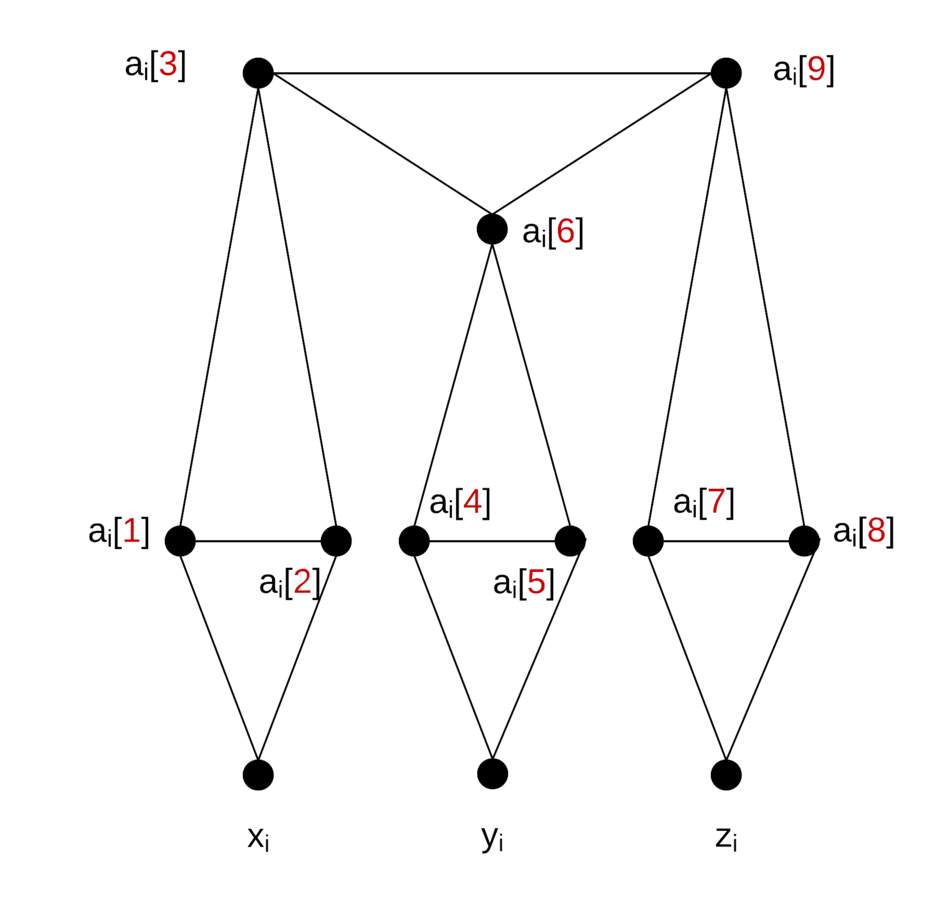Local replacement and
Partition into Triangles
Overview
- Theory of NP-Completeness
- Problem
- Theorem
- Proof
Theory of NP-Completeness
Definitions:
- P - deterministic polynomial-time decision problems
- NP - non-deterministic turing machine problems that can be verified in polynomial-time.
- NP-Hard - at least as hard as the hardest problems in NP.

Theory of NP-Completeness
NP-Complete:
-
A decision problem D is
NP-complete if:- D is in NP, and
- Every problem in NP is reducible to D in polynomial time

Problem
Instance:
A Graph G = (V,E) with |V| = 3q for a positive integer q.
Question:
Is there a partition of V into q disjoint sets v1, v2, ... , vq of three vertices each, such that, for each Vi = {Vi[1], Vi[2], Vi[3]}, the three edges:
{Vi[1], Vi[2]},
{Vi[1], Vi[3]},
{Vi[2], Vi[3]},
all belong to E ?
Theorem
Intuition:
Clearly Partition into Triangles is in NP because we can first non-deterministically guess a partition of V and then check (in deterministic polynomial time) that each Vi fulfills the triangle condition.
Theorem:
Partition into Triangles is NP-Complete.
Proof
Approach:
- We transform Exact Cover by 3-Sets to Partition into Triangles
- Polynomial time transformation using local replacement.
Local Replacement:
- Pick some aspect of the know NP-Complete problem instance to make up a collection of basic units.
- We obtain the corresponding instance of the target problem by replacing each basic unit in a uniform way with a different structure.
- The key point is that each replacement constituted only local modification of structure.
Proof
- Let the set X with |X| = 3q and the collection C of 3 element subsets of X be an arbitrary instance of Exact Cover by 3 Sets.
- We shall construct a graph G=(V,E), with |V|=3q', such that the desired partition exists for G if and only if C contains exact cover.
Proof:
Proof
- The basic units of the Exact Cover by 3 Sets instance are the 3-element subsets in C.
- The local replacement substitutes for each such subset ci = { xi , yi , zi } ∈ C the collection Ei of 18 edges shown in the figure below:
Proof:

Proof
- The only vertices that appear in edges belonging to more than a single Ei are those that are in the set X.
- |V| = |X| + 9 |C| = 3q + 9 |C| so that q' = q + 3 |C| and is therefore an instance of Partition into Triangles.
Proof:

Proof
- If c1, c2, ... , cq are the 3 element subsets from C in any EXACT COVER for X, then the corresponding partition V = V1 U V2 U ... U Vq' is given by taking
{ai[1], ai[2], xi}, {ai[4], ai[5], yi}
{ai[7], ai[8], zi}, {ai[3], ai[6], ai[9] }
from the vertices meeting Ei wherever ci = { xi , yi , zi } IS in the exact cover, and by taking:
{ai[3], ai[6], ai[9]}, {ai[3], ai[6], ai[9]}, {ai[3], ai[6], ai[9]}
from the vertices meeting Ei whenever ci IS NOT in the exact cover.
Proof:
Proof
- Let us say that it was {ai[1], ai[2], xi}
-
Then {ai[4], ai[5], yi}{ai[7], ai[8], zi}, and {ai[3], ai[6], ai[9] }
must also be in the triangle partition.
Proof:

Proof
- Therefore each x appears in exactly one chosen ci
Proof:

- This also implies that we choose exactly q ci elements of C.
- We have shown that G can be partitioned into
q' = q + |C| triangles if and only if C contains an exact cover of q sets for X.